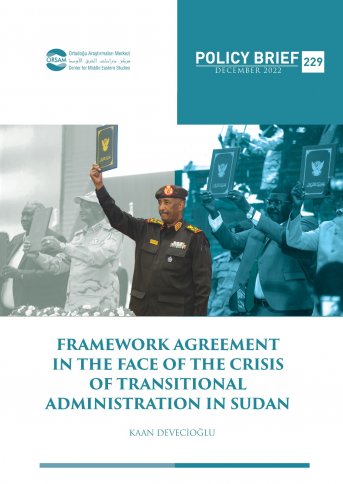
Türkiye-Israel Normalization Perceptions-Reality
In the course of Turkish-Israeli relations, which deteriorated with successive crises in the post-2008 period, positive developments were observed throughout 2021 with the telephone diplomacy between President Recep Tayyip Erdoğan and Israeli President Isaac Herzog, who was elected in July. The constructive contribution of the talks between the leaders in the process of the release of the Oaknin couple, who were detained in Türkiye for espionage allegations in November 2021, served as a catalyst for the most positive period in the last ten years of relations between the two countries. On the other hand, the reduction of the process leading to normalization in the context of the telephone diplomacy between Erdoğan and Herzog, although it is a highly successful diplomatic achievement, would prevent the correct understanding of the background dynamics. In fact, the expectations that relations would settle into a warmer framework were strengthened when the Turkish National Intelligence Organization (MİT) cracked down on an Iranian network that was preparing to attack Yair Geller, a businessman with Turkish and Israeli citizenship, and shared information with Mossad. Furthermore, the manner in which these developments in the process were reflected to the public also supported this expectation. On the other hand, it is observed that the publicly-known developments regarding the improvement of relations do not match the actual situation, especially when we look at the way they are understood and explained in some media organs, the press, academia, and think-tank circles in Israel. In Türkiye, especially in the media, the struggle to understand the indications of normalization through the opinions taken from Israeli spheres causes confusion, although there are very material facts at the core of the issue.
The analyzes about normalization, which are generally made known in public opinion, stipulate that deterioration and normalization of relations are entirely in Türkiye’s initiative. In some prominent comments, it is observed that Türkiye needs to get closer to Israel as a result of the COVID-19 pandemic, which has deeply shaken the world economy, and the difficulties it has experienced in the following period. Accordingly; Ankara, in line with its goal of becoming a regional trade center in energy, wants to be a transit route for the transportation of Israel's hydrocarbon reserves in the Eastern Mediterranean, and this situation has become a motivation for rapprochement with Tel Aviv. Another claim that draws attention is that as a result of Israel's establishment and normalization of overt/covert relations after the Abraham Agreements with many Arab and Muslim countries, especially the Gulf countries, and developing relations with Greece and the Greek Cypriot Administration of Southern Cyprus (GCA), it does not rely on Türkiye as much as it did in the past. In line with this view, it is stated that Türkiye's initiative determines the normalization process. In fact, there are allegations that Israel deliberately slowed down the progress in the improvement of relations and held back issues such as the appointment of ambassadors. There were extensive efforts to manipulate public opinion that Türkiye was in dire need of normalizing relations. Even though these claims were refuted by the decisions taken during Lapid's visit and the announcements that mutual ambassadors would be appointed in mid-August, the same course still continues in the perception dimension of the issue.
While the normalization process continues between the two countries, it is observed that some preconditions for normalizing relations with Israel have been put to the fore, even though such demands were not uttered in an official capacity. In addition to these, there is a contradictory approach that the responsibility for the deterioration of Türkiye-Israel relations belongs to Ankara. However, Israel's approach, which is difficult to describe as constructive, has been witnessed on many occasions, including the Mavi Marmara incident, for which Tel Aviv later apologized,-that caused deterioration in relations after 2008. It is possible to say that Israel's policies in the region were provocative in terms of Türkiye's threat perceptions during the period when relations were extremely strained and the ties between the two countries were severed after 2010. For example, the overt support of Israel in the so-called independence referendum of the Regional Government in the north of Iraq in 2017 is an important factor that deepened the negative course in relations. On the other hand, in 2018, when the discussions on the delimitation of maritime jurisdiction areas in the Eastern Mediterranean and the East-Med Project flared up, a meeting was held in the Greek Cypriot Administration, in which the ambassadors of Israel, Egypt, and the USA participated. The statements made at the said meeting that military options against Türkiye are also on the table in the Eastern Mediterranean have been a clear indication of Israel's framework of regional security policy and its attitude towards Türkiye. Again, there was a harsh reaction by the Israeli side against Türkiye's anti-terrorist operations against the PKK/YPG in northern Syria, which was uttered by many actors in the government and opposition, and the operations were unfairly accused.
In this general framework, a correct analysis of the breaking points and the process in general is essential in order to make the discussions on normalization, what it means for the parties and what it might mean in the foreseeable future, on healthier ground.








